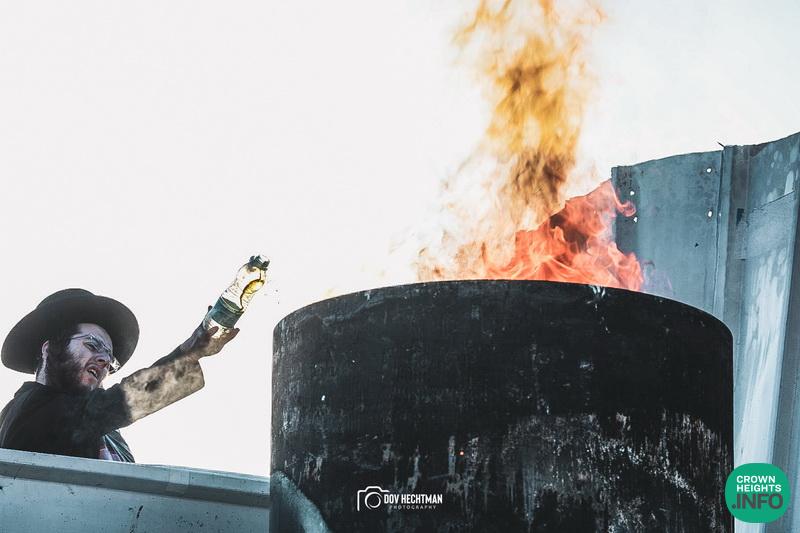
Weekly Dvar Torah: Lag Baomer, Pesach Sheni and Beis Iyar, Overcoming the Worlds Limiting View
Lag Baomer, celebrated on the 18th of Iyar, holds a special significance particularly regarding fertility and children. Throughout generations, there has been a deeply held belief among Jews that seeking the blessings of Rabbi Shimon bar Yochai, famously known as Rashbi, in the town of Meron can aid those struggling to conceive. Every year on the occasion of Lag Baomer, coinciding with the Yartzait of Rashbi, this practice is observed by our revered Rebbe’s to bless those who need blessings for children. A very popular destination on Lag Baomer for this purpose is the Rebbe’s Ohel.
The association between Rashbi and the granting of blessings for fertility finds its roots in a poignant tale from the Midrash told by the Rebbe. The narrative recounts the plight of a couple who endured a decade of barrenness following their marriage. In the Torah norms of that era, a marriage without children for ten years led to divorce, allowing each party to seek new unions that might yield offspring. Seeking counsel, the couple approached Rashbi, who, after careful consideration, advised them to proceed with the divorce. However, his guidance came with a peculiar instruction: the couple should mark their separation with a celebration akin to their wedding feast.
In obedience to Rashbi’s counsel, the couple organized a grand feast, inviting friends and family to partake in the festivities. As the revelry unfolded and spirits soared, the husband, perhaps emboldened by drink, approached his wife with an unexpected declaration of love. Despite the impending divorce dictated by societal convention, he expressed his enduring affection and invited his wife to choose the most precious item from their home as a parting gift. Seizing the opportunity, the wife ensured her husband indulged in further intoxication until he fell into a deep slumber. With careful orchestration, she arranged for her husband, still on his bed, to be transported back to her father’s house.
Upon awakening in unfamiliar surroundings, the husband, bewildered, inquired about his location. Learning that he was in his father-in-law’s house, he questioned the circumstances. His wife then recounted the events of the previous night, emphasizing his declaration to her to take the most precious possession and her consequent decision to bring him along. Confronted with the depth of their love and the absurdity of their situation, the couple sought Rashbi once more for guidance.
Moved by their story and recognizing the purity of their love, Rashbi blessed the couple, invoking Divine intervention for the fulfillment of their desire for children. Miraculously, their prayers were answered, and they were blessed with offspring, thus beginning a new chapter of happiness and fulfillment.
The Midrash draws a profound lesson from this tale, highlighting the role of Divine intervention in altering the course of nature. Just as God responds to the cries of the barren and grants them fertility, so too can the righteous, represented by Rashbi, facilitate miraculous interventions in the lives of the faithful. However, the narrative underscores that this blessing was only realized following the earnest plea of the couple, signifying the importance of sincere supplication in invoking Divine grace.
The narrative of Rashbi and the barren couple finds resonance in the broader tapestry of Jewish tradition, where the power of human petition intersects with divine benevolence to bring about transformative outcomes. It serves as a testament to the enduring belief in the efficacy of prayer and the capacity of the righteous to effect miraculous change in the lives of the faithful.
This message is further reinforced by Pesach Sheni, observed on the 14th of Iyar, it commemorates an episode from the biblical narrative where impure individuals petitioned for a second chance to observe the Passover festival. In response to their sincere plea of “why should we be deprived?” G-d granted them an opportunity to participate in the festival at a later date, demonstrating Divine responsiveness to human entreaty.
The celebration of Rebbe Maharash’s birthday on the 2nd of Iyar further amplifies this theme. His proclamation, “The world says that if you cannot crawl under, try to leap over. However, I say it is necessary to leap over from the outset!” encapsulates a philosophy of proactive resilience and unwavering faith in transcending limitations. This statement is prefaced by an acknowledgment of the prevailing worldview which is limited and constrained, then we proceed to rise higher beyond the prevailing limiting weltanschauung.
Collectively, these narratives weave a rich tapestry of faith, resilience, and Divine intervention. They serve as enduring reminders of the transformative power of prayer, the efficacy of human initiative to push the envelope, and the boundless miraculous G-dly intervention in the lives of the faithful. We start by recognizing our limited and natural state of being, and we go on to challenge our boundaries and demand more. As a response the G-dly supernatural prevails.
Through these stories, individuals are inspired to overcome life’s challenges with courage, resilience, and unwavering faith in the guiding hand of Divine Providence.
Have a Superseding Shabbos,
Gut Shabbos
Rabbi Yosef Katzman











